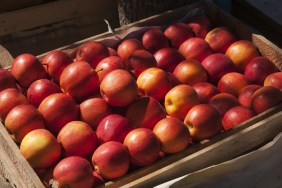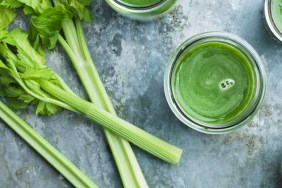
Image: Getty
Here’s some news that may shock you — eating healthy may not only affect your waistline and overall health, but it may also make you less prone to skin cancer, wrinkles and fine lines. In fact, there are a number of so-called sun-fighting superfoods that can help protect against UV rays from the inside out.
“When we talk about sun-fighting superfoods, it’s important to remember that what we used to think of as antioxidants or free radical damage, we now recognize as DNA repair and DNA damage respectively,” explains Dr. Ronald Moy, dermatologist, cosmetic surgeon and founder of DNAEGF Renewal. “DNA damage can occur from sun damage, aging, pollutants, carcinogens like cigarettes and even a hamburger (I’ve personally seen evidence that you can actually measure DNA damage on a person immediately after eating a hamburger), so what you eat definitely directly affects your skin and levels of DNA damage.”
Moy goes on to explain that when we consider superfoods, it’s important for us to consider what they’re doing to lessen our DNA damage. “Going after, among other things, fruits and leafy vegetables are surefire ways to help decrease your DNA damage as studies have generally shown that a diet rich in fruits and vegetables may prevent cancer.”
Note, however, that while these superfoods may boost your skin’s ability to protect itself from the sun, they are in no way a replacement for sunscreen, which should be applied every day of the year. “Excessive exposure to UV rays can activate free radicals in the skin and cause accelerated aging and skin cancer, the most common cancer in the United States. Free radicals generate wild chain reactions and impair skin cells through a process called oxidation, comparable to rusting. The cells are punctured, then torn apart, resulting in skin wrinkling,” explains Nicholas Perricone, MD, FACN, CNS. “The skin reacts to the damaging effects of UV rays by generating an immune response inflammation, which is visible as sunburn.”
Perricone recommends that his patients fight signs of aging and skin cancer with a three-tiered approach: The use of a protective sunscreen for the face and body daily, nutritional support in the form of antioxidants to strengthen skin’s immune system and protect it from further sun damage and an antioxidant-rich diet complete with high-quality proteins, fresh organic fruits and vegetables, complex carbohydrates and clean water.
With all that in mind, we asked the doctors to highlight what they consider to be the most potent sun-fighting superfoods to complement the sunscreen we’re all already slathering on every day (right?).
Wild Salmon
“An outstanding source of the carotenoid antioxidant known as astaxanthin (1000 times more effective than vitamin E), which helps to repair damage from UV rays and keep skin radiant and youthful. The omega-3 essential fatty acids in salmon also act as powerful, protective anti-inflammatories,” says Perricone. “In addition to salmon, mackerel, trout, herring and sardines are also rich sources of omega-3 fatty acids that can protect skin from deadly melanoma and other forms of skin cancer from sunburn.”
Foods High in Catechins
“Green tea, strawberries, blue and blackberries, apples and cocoa are among the antioxidant foods high in catechins, which also protect the skin from UV damage. The deeper and richer the color, the higher the catechin content. The most powerful catechin is epigallocatechin-3-gallate (EGCG), which is 100 times more potent than vitamin C and 25 times stronger than vitamin E. Green tea is one of our richest sources of EGCG,” explains Perricone.
Watercress and Broccoli Sprouts
“Also in the cruciferous family, [watercress and broccoli sprouts] contain sulforaphane, which is linked to increasing the skin’s ability to protect itself from cancer. Broccoli sprouts are the richest source of cancer-fighting glucoraphanin, the precursor of sulforaphane,” says Perricone.
Red Wine
“Resveratrol is a phytoalexin antioxidant found in red grapes. It has both chemopreventive and therapeutic effects against skin diseases, including sun damage from ultraviolet radiation-mediated oxidative stress and cutaneous damages, including skin cancer,” explains Dr. Neal Schultz, New York City dermatologist, host of DermTV and creator of BeautyRx by Dr. Schultz. He goes on to hypothesize that it will probably become mainstream for skin protection by topical application, but cautions that to get enough resveratrol to your skin from drinking red wine, the alcohol in the wine will likely overcome you first, “causing you to drop the glass and fall asleep long before you’ve drunk enough to get the true skincare benefits!”
Dark Chocolate
“Cocoa, in high concentrations in dark chocolate, is rich in antioxidant flavanols, which include procyanidins, epicatechins and catechins (also called flavonoids). Studies have shown that people with high blood levels of flavonoids have lower risk of heart disease, prostate cancer and type 2 diabetes,” says Schultz, who maintains that while it is possible that you eat enough for those antioxidant flavonoids to reach the skin in high enough concentrations to protect from the sun, there isn’t enough research on the topic yet to say so with certainty.
Tuna and Chicken
Nicotinamide, also known as vitamin B3, is contained in both of these foods and it has been shown to help prevent skin cancer, according to Moy.
Tomatoes
According to Perricone, a study performed in 2001 looked at volunteers who ate 40 grams of tomato paste over a 10-week period. The group was 40 percent less likely to experience sunburn when exposed to harmful UV rays. “But don’t forget to add a little olive oil to insure absorption of the special skin-protecting phytochemicals.”
Kale, Spinach and Chard
“Folic acid is contained in these leafy greens and in an 11-year study of 1,000 adults in Australia, it showed that daily intake of these vegetables was associated with a 41 percent decreased risk of skin cancer,” according to Moy.
Watermelon
Watermelons are rich in lycopene, making it a great choice to protect your skin from sunburn and the possibility of developing skin cancer, according to Perricone. “Lycopene can prevent UV-induced sunburn. It is rich in the aforementioned tomatoes and tomato paste, watermelon as well as apricots, pink grapefruit and red (not orange) carrots.”
Ginger and Turmeric
“These delightful spicy roots can be added to salads, stir-fries, curries, soups and stews. Ginger prevents the breakdown of elastin in the skin, helping to prevent the wrinkles that result from UV radiation. Turmeric, an antioxidant, anti-aging powerhouse, protects collagen — key in keeping your skin youthful and radiant,” explains Perricone.
Apples
“Polyphenols are contained in apples, which show great DNA damage protection potential,” says Moy.
Pumpkin Seeds and Squash Seeds
“These (along with spinach) contain high levels of zinc, which is an important cell regulator in that it’s instrumental to healthy cell proliferation,” says Moy.







